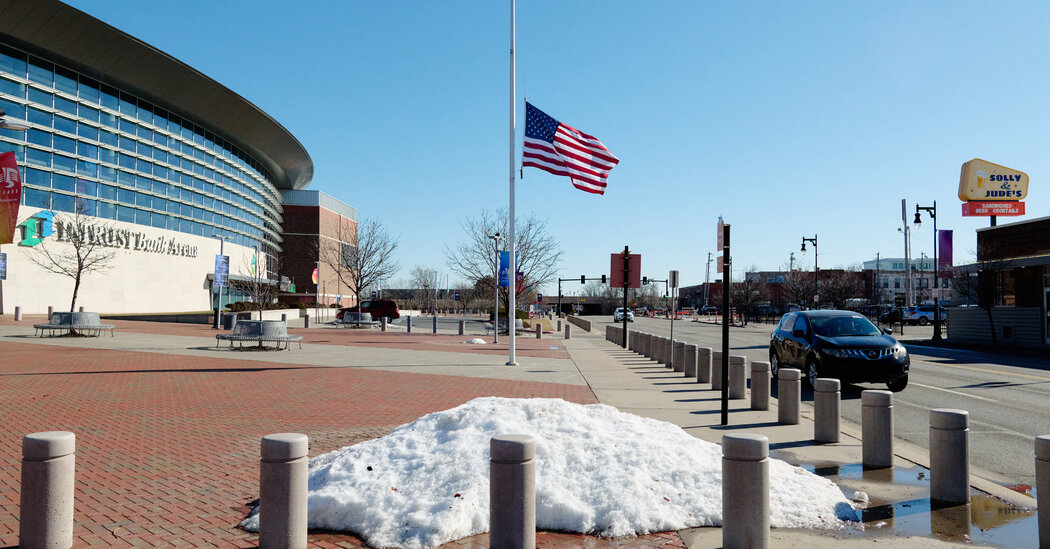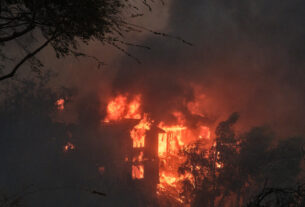Wichita might be the country’s smallest big city. Or perhaps the country’s largest town. It is both big, with nearly 400,000 residents, and 550,000 in the larger metro area; and small, the type of place where you know your banker and bump into a friend while running errands.
In recent years, Wichita has dreamed of national recognition, bidding to host major sporting events and vying for new nonstop flights, often by touting Wichita’s legacy as the center of the country’s aviation industry.
Last week, the city fulfilled those two ambitions, hosting the U.S. Figure Skating Championships for the first time, with many spectators and competitors ferried directly to and from Washington, D.C., on a direct flight that was inaugurated just last year.
On Wednesday, those milestones were forever marked by tragedy, when a passenger jet and an Army helicopter collided above the Potomac River in Washington. Many on the flight from Wichita were elite youth figure skaters and their coaches and families.
“This is now unfortunately part of Kansas aviation history,” said Ben Sauceda, the chief executive of the Kansas Aviation Museum in town.
That these skaters were in Wichita was no coincidence. The Wichita Figure Skating Club and Visit Wichita, the region’s tourism marketing arm, had worked to persuade U.S. Figure Skating to hold its championship event in town.
“Hosting the championships has been on our wish list for years,” said Susie Santo, the president and chief executive of Visit Wichita.
Over the last decade, the city has hosted sectional and regional competitions, synchronized skating competitions and theater-on-ice competitions. All of that work culminated last week, when for five days the best skaters in the country competed downtown.
Many in Wichita hoped the event would be transformative for its small figure skating community. But the loss of the skaters, who had attended an elite development camp in town after the competition, abruptly recast what was to be a catalyzing moment.
“We ended last week feeling really great about how everything went, and a short time later this tragedy happened, and all of that went away,” said Jolene Taylor, president of the Wichita Figure Skating Club.
Ms. Taylor volunteered at the development camp on Monday, spending time with a group of teenage boys, a couple of whom were on the flight. What sticks in her mind besides their skill, she said, was their manners — not always a strong suit for teenage boys.
“They are competitors, but they were so kind to each other, they were so polite to me as their team escort,” she said. “There was always a please and thank you for everything.”
The Wichita Figure Skating Club is one of the smaller clubs in the Midwest. Its membership fluctuates but is currently around 60, half youth, half adults. None of its young skaters were invited to the elite development camp, but its members love skating. Some just do it recreationally, while others practice regularly and travel to competitions.
“Skating really is for everyone,” Ms. Taylor said.
At the championships, some club members volunteered as sweepers, picking up stuffed animals or flowers thrown onto the ice. Others were able to see some of their heroes up close, as they practiced at the Wichita Ice Center.
The club’s learn-to-skate program is growing. And last fall, more than 700 first-time skaters participated in the city’s SkateFest.
After the crash, a fog — both literal and figurative — settled over Wichita, as residents waited to learn if they knew anyone on the flight.
The Rev. Pamela Hughes Mason of St. Paul A.M.E. Church, heard about the crash on Wednesday night when she said she received a short text message: “Are you OK?”
“That is a familiar flight for most of my congregation, and people that know me,” Ms. Mason said. “At that hour, it began with phone calls, organizing, praying.”
Wichita brands itself as the air capital of the world, the historic home of Cessna and Beechcraft planes, and a major manufacturing center for parts and planes for Boeing, Airbus and Bombardier.
“It really is ingrained in the fabric of who we are,” said Mr. Sauceda of the aviation museum.
But getting to and from the city is not easy. Most flights from Wichita Dwight D. Eisenhower National Airport are to regional hubs like Denver, Dallas and Atlanta, where residents catch a connecting flight to their ultimate destination. Some drive two hours to Oklahoma City, or even three hours to Kansas City for more options.
The daily flight to Washington is Wichita’s only direct connection to the northeast. It began just a year ago, after a campaign by city and state officials.
“I know that flight, I’ve flown it many times myself,” said Jerry Moran, the senior U.S. senator from Kansas, at a Thursday news conference. “I lobbied American Airlines to begin having a direct nonstop flight service to D.C.A.,” the Washington airport.
Mr. Sauceda reeled off a list of aviation officials — the head of SpaceX, the head of Airbus Americas, the NASA administrator — who have visited town in recent years, but only after a layover.
The direct flight, he said, “really has helped boost Wichita trade.”
After being canceled on Thursday, the flight to Washington resumed on Friday. And even as recovery efforts are ongoing, Wichita officials are trying to support those from near and far who lost loved ones, and to honor those who died.
The Wichita Foundation, a community foundation that disburses millions in grants annually, has started a fund to support families, and there are discussions about establishing memorials for the skaters and other victims.
“Our hearts are broken,” said Ms. Santo of Visit Wichita. “We consider them family. For all the Wichitans and others that lost loved ones, we are here to assist.”





